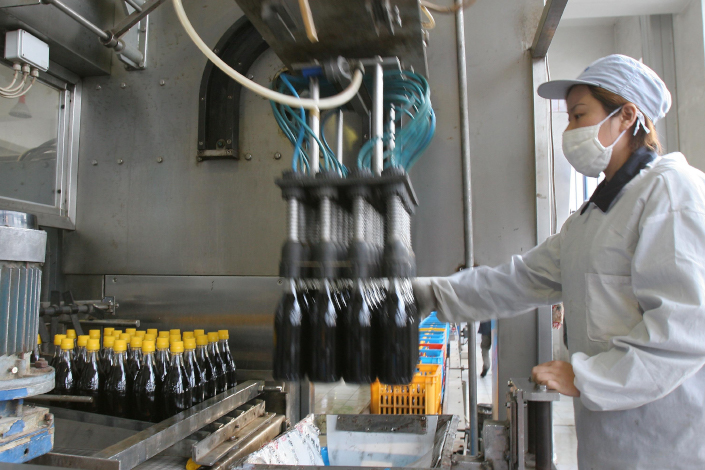Chinese Food Giants Hike Prices as Costs Rise

Several Chinese food giants have announced an increase in the retail prices of their products, as rising production costs and a higher producer price index (PPI) erode profit margins.
Companies including Foshan Haitian Flavouring & Food Co. Ltd. (603288.SH), Jiangsu Hengshun Vinegar Industry Co. Ltd. (600305.SH), and Chacha Food Co. Ltd. (002557.SZ), have raised their prices as much as 18% in the past month.
Vinegar producer giant Jiangsu Hengshun said Wednesday that some products will be priced between 5% and 15% higher, starting from Nov. 20, due to a “significant” increase in costs of raw inputs and freight transport.
“Higher retail prices may not result in better profits, because it also affects sales volumes, coupled with inflating production costs,” Jiangsu Hengshun added in the exchange filing (link in Chinese).
At least three other food producers have released similar announcements just this week. Fresh food manufacturer Haixin Foods Co. Ltd. (002702.SZ) and seasoning producer Fu Jian Anjoy Foods Co. Ltd. (603345.SH) announced an increase in retail prices by between 3% and 10%, as well as lower discount rates during promotions. Yeast producer giant Angel Yeast Co. Ltd. (600298.SH) also issued a notice (link in Chinese) on Monday to disclose higher retail prices, just over a month after it hiked prices for the first time in late September.
Those three firms also blamed increasing costs of raw inputs.
Recent extreme weather in many growing regions has damaged crops and led to soaring vegetable prices, while pork prices have also been on the rise.
From Oct. 18 to Oct. 24, the weekly average price of monitored vegetables reached 5.57 yuan ($0.87) per kilogram, marking the fifth straight weekly increase and a rise of 24% from five weeks earlier, according to data from the agriculture ministry. In the period, the average wholesale price of pork surged 13% from two weeks earlier.
Meanwhile, the average price of imported soybeans jumped 29.4% year-on-year over the first three quarters, reaching an eight-year high in June of 3,658.5 yuan a ton. Soybeans are crushed for use as livestock fodder, while their oil is a key input in many food products. Soybean imports accounted for over four-fifths of the soybeans consumed in the country in 2020, according to figures released by the National Bureau of Statistics (NBS).
Other bulk commodities are also becoming more expensive. Prices of corrugated paper for packaging material surged 19.58% over this year through mid-October, NBS figures showed. The price of wheat rose 6.42%, and the price of soybeans jumped 5.32%.
“The impact of increasing prices of bulk commodities will pass from producers to consumers in the long term,” said Liu Shijing, vice director of China Development Research Foundation, at a summit on Oct. 26.
In addition to raw materials and ingredients, the firms have also cited other pressures, such as the increasing costs of energy, labor and freight.
The producer price index (PPI) of September rose 10.7% from a year earlier, a growth rate that has never been seen in official data going back to 1996, when the index for food industry rose 0.7% year-on-year, according to the NBS. The PPI reflects how manufacturers set their sales prices to the consumer.
Higher production costs appear to have hurt the food companies’ financial performance. For the third quarter, Haixin’s net profit plunged 128% year-on-year; Hengshun’s dropped 91.19%; and Angel Yeast’s fell 35.23%.
In contrast, the announcement of the retail price hikes proved to be a positive for investors. Stock prices of food producers jumped Tuesday, with shares of Anjoy Foods surging 8.13%, Angel Yeast increasing 7.59%, and Haitian up 6.3%.
The jump in stock prices came a day after a notice from China’s commerce ministry sparked food supply fears when it directed local authorities to tell households to stock up on daily necessities for winter in case of emergency. Sources later stressed that the notice was a regular seasonal announcement.
Tang Ziyi contributed reporting.
Contact reporter Manyun Zou (manyunzou@caixin.com) and editor Bertrand Teo (bertrandteo@caixin.com)
Download our app to receive breaking news alerts and read the news on the go.
Get our weekly free Must-Read newsletter.







